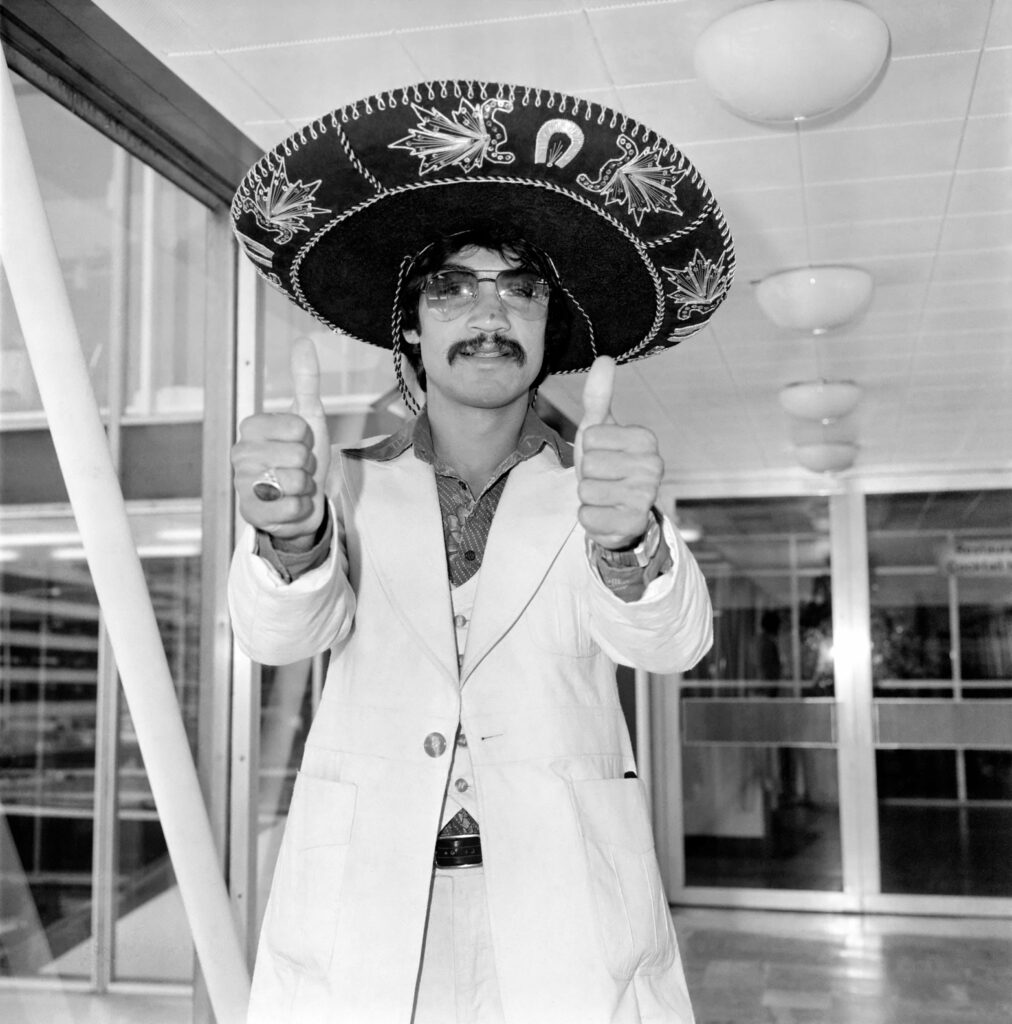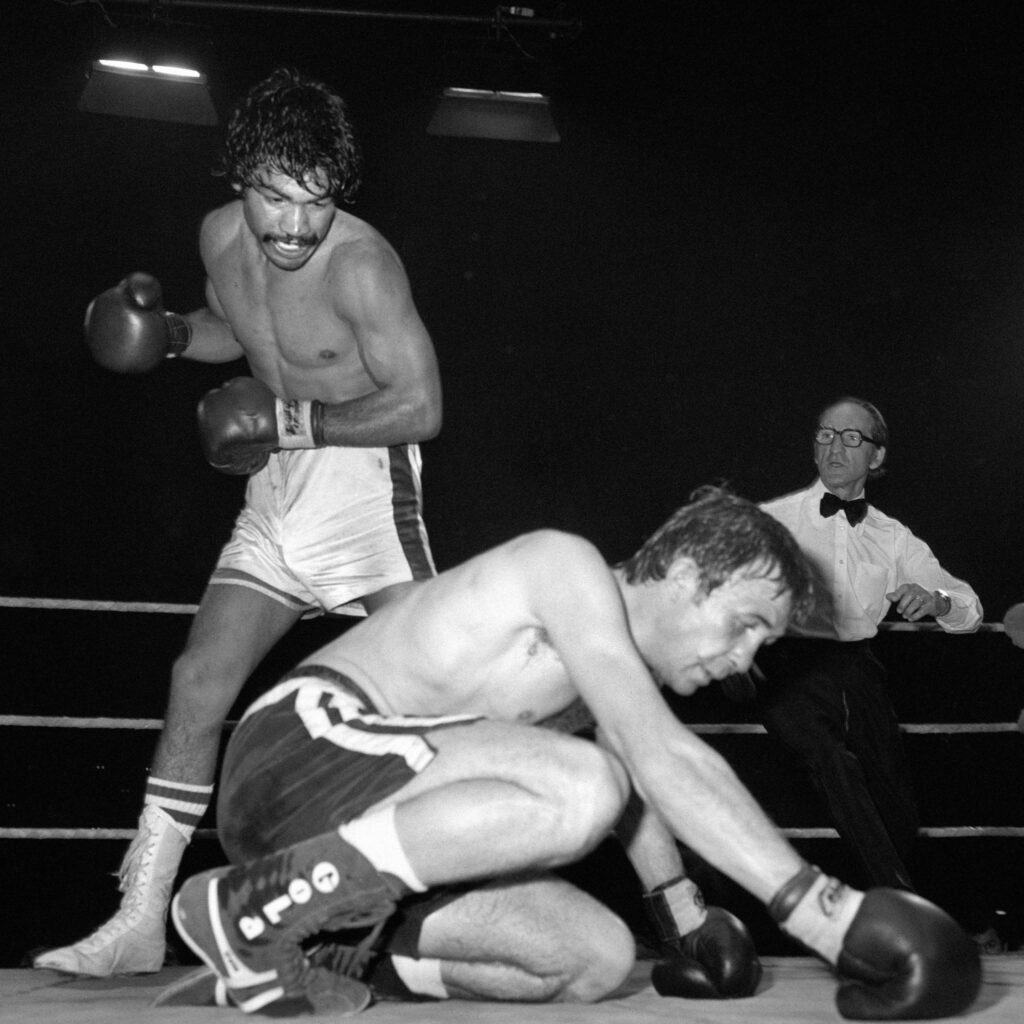Sunday starts the same as all the rest for retired world champion and busy, working actor, Carlos Palomino; it starts with hundreds of sit-ups. Age – although frequently downplayed as just a number – has been kind to the Mexican-born fighter.
“I can’t run anymore because of my knees, but I walk five miles every day, I have some weights in my bedroom, I do like 200-300 sit-ups every day. It’s just a routine to me, you know,” he tells Boxing Social. Of course, the structure of a life spent sweating on the floors of Los Angeles’ gyms after hard sparring and breathing in panic in the dressing rooms of venues worldwide is hard to shake – even now, aged 71-years old.
Palomino is watching the Rams, his NFL team of choice, and is accompanied by his little dog. Life during the pandemic has been stripped back, as it has been everybody, but the most frustrating aspect of the last 12 months has been a loss of acting opportunities, a passion Carlos stumbled upon towards the end of his initial stint as a prize fighter in the late ‘70s.
“I have a film project in the works. There was a production company that wanted to do my life story. I sold the rights to do my own film, and that’s in the works now also. It all started when I took a drama class when I was at the University of Long Beach and I really liked it, but I didn’t know how to get involved in that world. I just fell in love with the work, and I knew I wanted to do it.
“I retired from boxing the next year and in ’79, I started pursuing my acting career. I’ve studied quite a bit at the Strasbourg Institute, I was there for a couple of years. I’m working on a film just now, it’s a true story that comes right after the Mexican American civil war. This guy became a rebel at that time, he took up arms and he had guys who rolled with him, robbing gold, robbing banks. I have a role in this film where I’ll be playing a priest, and I’m really looking forward to that.”

Photo: Alamy/Trinity Mirror.
Dabbling with on-screen roles was initially a safe escape from the dangers presented by boxing opponents such as Roberto Duran and Wilfredo Benitez. Palomino lost to both greats by decision – although his fight with the latter (hosted in El’ Radar’s home nation of Puerto Rico) was contentious. He had earlier won the WBC welterweight crown by halting Londoner John H. Stracey in the final round at the Empire Pool, Wembley, in 1976.
Acting has allowed him to manifest different versions of himself; boxing initially had offered something similar, but after a slow start and genuine disinterest, it later defined him.
“I wanted to play baseball – that was my favourite sport. I wanted to play second base for the Dodgers. My dad told me I couldn’t play any sport unless I boxed. So, I didn’t find anything difficult about [stepping away]. I had two years amateur, seven years pro; I look back at it fondly. I don’t find any difficulties stepping away – I was ready for it. I’m proud, my whole family are really proud of me. None of them saw me fight; they Google me and say, ‘God, you were great’. That’s what really uplifts me now.”
Palomino is a member of a limited, respected fraternity. In 2004, he was inducted into the International Boxing Hall of Fame, joining Azumah Nelson and Daniel Zaragoza. His seven successful defences of his WBC world title were more than respectable, but on reflection, Palomino (31-4-3, 19 KOs) knew he’d be defined by his high-profile losses in equal measure.
“I was always a guy that took a shot. Nobody had ever hurt me prior; I’d fought some pretty big punchers coming up, even as an amateur. I just didn’t think he was gonna get to me,” admitted the Los Angeles-resident, when reflecting on his toughest opponent, a savage, bearded Panamanian.
“I thought if I could get to him on the inside, I was bigger, stronger and I could take him on. But then, I’m in the gym one day sparring and some guy is in the gym, and he says, ‘Listen, I’m a big [Roberto] Duran fan, but I’m a fan of you. It’s going to be an incredible fight – but do not try to fight Duran inside.’ I said, ‘Why? That’s my fight.’ He goes: ‘I’m telling you, man. He’s different on the inside to most fighters you’ve fought.’
“I went outside, but he was even more difficult on the outside. His speed was just… he was hands down the best fighter I ever fought. As much of a defensive genius as Benitez was, Duran was better. He was the best by far. A win over Duran – in the last fight of my career – that would just be the icing on the cake. I decided [after that] I was stepping out, but you gotta remember that boxing wasn’t my number one love – baseball was. I became a fan; I’d watch more boxing, and I started getting jobs as a commentator.”

Photo: Alamy/Press Association.
Still a fan even now, Palomino told Boxing Social that two-weight world champion Oscar Valdez hails from the same Mexican streets that he did. You can’t help but assume they look rather different now. Both emerged at the sport’s precipice; Palomino emerged with as many faculties as possible, holding intriguing, detailed conversation for the best part of two hours.
Reliving his tough, tortuous childhood scrapping for snacks in the front lawn, and sharing stories of his time in the US Army, he’d tried his hand at things most can only observe. Family keeps him occupied and sport continues keeping him happy – from the outside looking in. Carlos Palomino knows the importance of a wise, old head on young, muscular shoulders, and departed with his own secret to success in a dirty business.
“I didn’t have a lot of hangers on. I had my family and my friends, we’d all get together with a mariachi, tamales, tacos, and a party all night. I had these four guys; they’re still my friends and we still go out for lunch together. I had a lot of people trying to disrupt me, but I wasn’t about that. That’s not it, man. Those guys were my nucleus; they kept me together and they kept my head on straight.
“I always say the same thing: I left it in the ring. I always felt like I was gonna be in better shape than my opponent, because I always gave it all, man. I left my heart and my soul in the ring, and that’s the most important thing from me. I want people to understand what I gave to the sport, and what it meant to me…”
He doesn’t say “everything” as he trails off, but he really doesn’t have to.
Main image: WBC.
